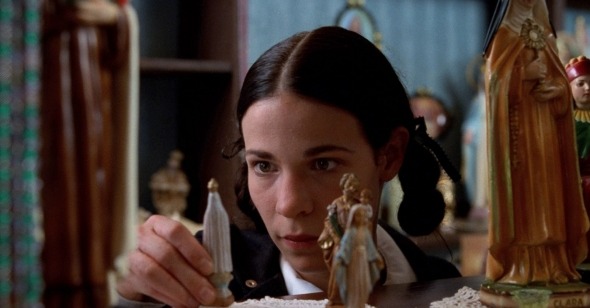Truer Love
By Jourdain Searles
NYFF 2023:
Household Saints
Nancy Savoca, U.S., 1993, Milestone/Kino Lorber
Nancy Savoca’s Household Saints is a difficult film to describe. Perhaps this is why since its release just over 30 years ago, it has never been made available on DVD and has mostly gone unseen by audiences. After winning the Grand Jury Prize at Sundance for her feature directorial debut True Love (1989), Savoca followed it up with arguably her most famous film, Dogfight (1991). Starring Lili Taylor and River Phoenix at the height of his stardom, Dogfight premiered at Telluride and was released by Warner Bros to critical success and was subsequently in heavy circulation on cable. But her third feature was a bit more ambitious. Household Saints, based on the novel of the same name by Francine Prose, was more complicated than a love story. It was about the families lovers come from and the futures they build for themselves. It was a girl-meets-boy story with a “happily ever after” complicated by the wheels of fate. It was about more than romantic and parental love, expanding into something of nearly biblical proportions. And yet the tone lacks any of the self-importance these themes imply. There’s a darkly comedic edge to everything we see in Household Saints, with a disorientingly sincere performance at the center.
The film reunites Savoca with Taylor, whose character’s intense religious journey emerges as the focus of the narrative. But before we meet her, we are treated to her parents’ love story. Joseph Santangelo (Vincent D’Onofrio) wins his wife, Catherine Falconetti (Tracey Ullman), in a card game with her father, Lino (Victor Argo). Her older brother, Nicky (Michael Rispoli), is there too, sweating profusely and fantasizing about the opera Madame Butterfly. It’s the hot summer of 1949, and everyone is dreaming of a better life. In his butcher shop the next day, Joseph sexually teases Catherine with a sausage, pressing his thumb to it gently. She doesn’t know what it means, but her curiosity is clear, as much as she tries to hide it. Like any heartbreaker, Joseph wants the one girl who doesn’t want him back. And she’s fascinated by his interest, wondering why anyone would give her a second look. Catherine’s presentation is plain and pious while Joseph cuts a large, charming, swaggering figure. Naturally, opposites attract and their chemistry has a playful innocence to it.
Eager to marry off his mousy daughter, Lino invites Joseph and his mother, Carmela (Judith Malina), over for dinner. But Catherine isn’t much of a cook and immediately earns Carmela’s disapproval. While his mother finds a hair in her food, Joseph eats smiling, complimenting the sauce on the meat. “Since when does love know about great food?” his mother asks him later. She knows she’s already lost. Joseph and Catherine marry, and she soon finds out what he can really do with a sausage. The story that follows is about their life together, with all its ups and downs. Their first child dies shortly after birth, and Carmela’s Catholic superstition soon overtakes the household. Even after she passes away, her spirit lingers in their home. Soon, Catherine gives birth to a healthy baby girl named Teresa who grows into a pious young woman, as if conceived entirely by her grandmother’s prayers.
None of her parents’ lust or humor is present in Teresa (Lili Taylor), who eats very little and has no interest in boys. There’s only one man for her, and that’s Jesus Christ. Her strong desire to join the Carmelites enrages her father, who wants her to live the life of a traditional Italian woman, becoming a wife and mother. Catherine is more measured in her conflicts with her daughter, but it’s clear she agrees with her husband. Still, Teresa feels as if she has a higher calling, and refuses to hear otherwise, praying and starving herself to prove her point. Though the biological product of carnal passion, Teresa exhibits disinterest in the pleasures of the flesh, alienating herself from her parents and peers. Taylor has made a career of playing complicated, melancholic women, and this is one of her finest performances.
As the romantic portion of the narrative dissipates, it gives way to a comically tragic tale of unwavering faith. Household Saints succumbs to the earnest glow of church candles. Though Teresa is gravely serious, Taylor’s nuanced performance reveals the turmoil of intense faith and questions its purpose. And yet Household Saints isn’t interested in condemning Teresa for her unwavering devotion. Savoca simply presents the contradictions as they are and leaves it up to us to decide what we believe. When Teresa finally becomes involved with a young man named Leonard (Michael Imperioli), it’s as if humanity itself has reached out to her. Watching her experience human pleasure is almost a relief. But what does that say about us? She says she only wants Jesus, so why is it that we still want something else for her?
There are no simple answers to these questions, and Savoca forces us to sit with our unease. Joseph and Catherine’s confusion with their daughter underlines that not only can you not choose your family but also there’s no way to control your children. Just as Joseph chose a wife his mother didn’t approve of, Teresa chooses a life her mother and father cannot understand. But they have to find a way to love her, actively and with as much passion as their own union. There’s something powerful about that kind of love. Just as Teresa loves Jesus even when she doesn’t understand him, they must love their daughter even if her actions never make sense to them. Though not as sweet as True Love or as romantic as Dogfight, Household Saints is indeed a love story, encapsulating the many ways love shows itself and withholds, keeping the mystery alive. Love, much like faith, is often illogical. And that’s what makes the small moments of beauty all the more special.
